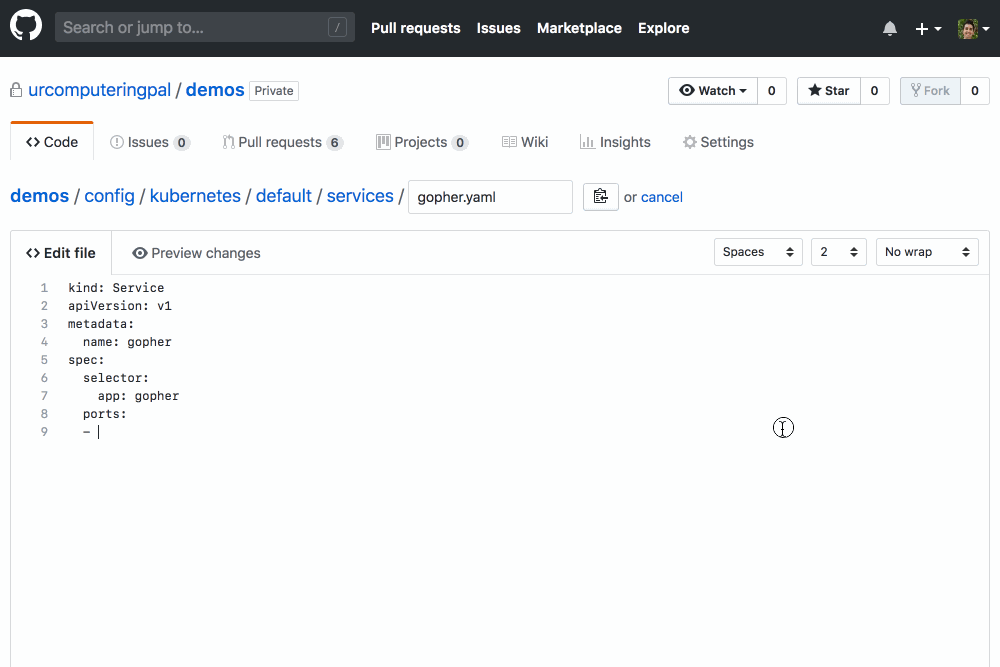A GitHub App that validates the Kubernetes YAML in your GitHub PRs using kubeval.
- Improve the experience of changing and reviewing YAML documents representing Kubernetes resources by detecting and highlighting errors automatically.
- Allow validation against multiple schemas to support applications deployed to multiple Kubernetes clusters with disparate versions.
- Explore the viability of writing a generalized Probot-like GitHub App toolkit in Golang.
- Validate the syntax of your YAML. (Shameless plug: use YAMBURGER for that! It's kinda dope!)
The authors of kubevalidator maintain a hosted version of the source code you see here. Install it today if you're comfortable with us processing your YAML! See the section on deploying your own instance if you'd prefer.
kubevalidator depends on you to tell it which YAML in your repository it should validate using a file at .github/kubevalidator.yaml. This repo's config is a decent example:
apiversion: v1alpha
kind: KubeValidatorConfig
spec:
manifests:
- glob: config/kubernetes/default/*/*.yaml
schemas:
- version: 1.10.0
- version: 1.10.1
#
# Schema options and their defaults. See config.go for more details.
#
# version: 'master'
# name: 'human readable name' # defaults to the value of version
# If the schemas in https://github.com/garethr/kubernetes-json-schema
# don't work for you, fork it and drop your username here! Your schemas
# will be used instead.
#
# schemaFork: garethr
# Set this to openshift to use schemas from
# https://github.com/garethr/openshift-json-schema instead.
#
# type: kubernetes
See CONTRIBUTING.md
These instructions are untested. Please open a new issue or PR if you run into any problems or would prefer to use another deployment tool!
- Fork & clone this repo.
- Edit or delete the included Ingress and/or Service resources to match your target cluster's load balancing requirements.
- Create a new GitHub App with the following settings:
- Homepage URL: the URL to the GitHub repository for your app
- Webhook URL: Use https://example.com/ for now, we'll come back in a minute to update this with the URL of your deployed app.
- Webhook Secret: Generate a unique secret with
openssl rand -base64 32and save it because you'll need it in a minute to configure your deployed app - Permissions:
- Checks: Read & Write
- Repository contents: Read-only
- Repository metadata: Read-only
- Pull requests: Read-only
- Webhooks:
- Check Suite
- Pull Request
- Generate and download a new key for your app. Note the path.
- Create a secret with values to authenticate your instance of kubevalidator as your GitHub app
kubectl create secret generic kubeval
--from-file=PRIVATE_KEY=~/Downloads/path-to-kubeval-key.pem \
--from-literal=APP_ID=1234 \
--from-literal=WEBHOOK_SECRET=1234 \
--dry-run=true -o yaml > config/kubernetes/default/secrets/kubeval.yaml
- Configure access to a Kubernetes cluster.
- Create a
kubevalidatornamespace on that cluster. - Install Skaffold.
- Run
skaffold runto deploy this application to your cluster!
- 🙇 to @keavy, @kytrinyx, @lizzhale and many more for your work on GitHub Checks. PRs aren't ever going to be the same.
- 🙇 to @garethr for your work on kubeval. It does all of the heavy lifting here, I've just put some GitHub-flavored window dressing on top.
- 🙇 to @bkeepers for your work on Probot. I've learned a ton building Probot apps in the past few months, and hope that you don't mind that I've poorly re-implemented a small portion of it in Golang in this project. 😉
Please file an issue! If you'd prefer to reach out in private, please send an email to pal@urcomputeringpal.com.
